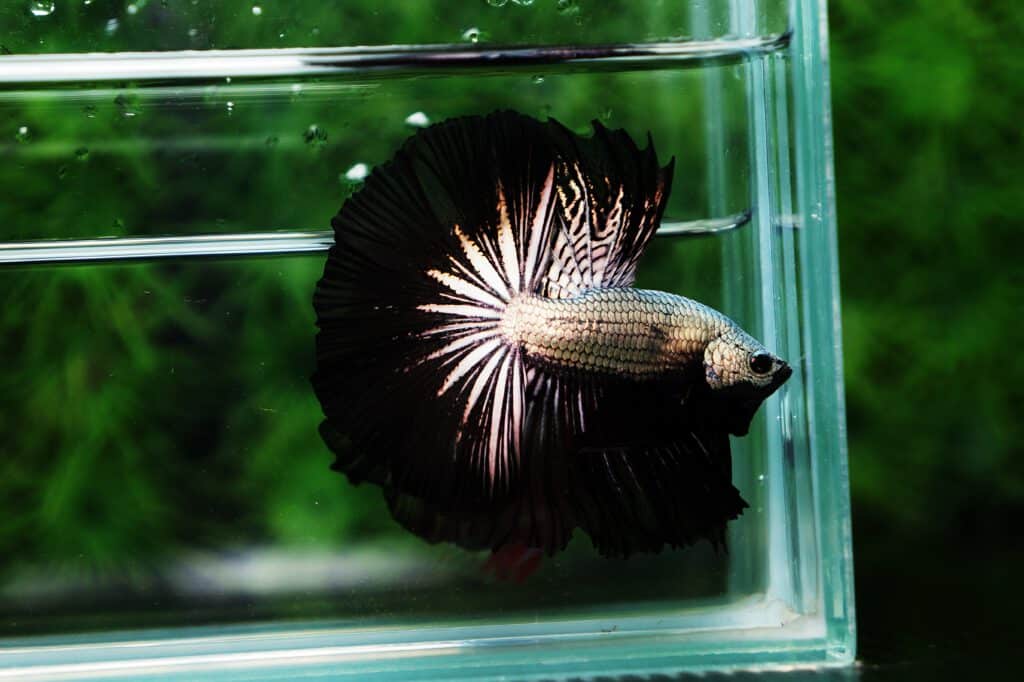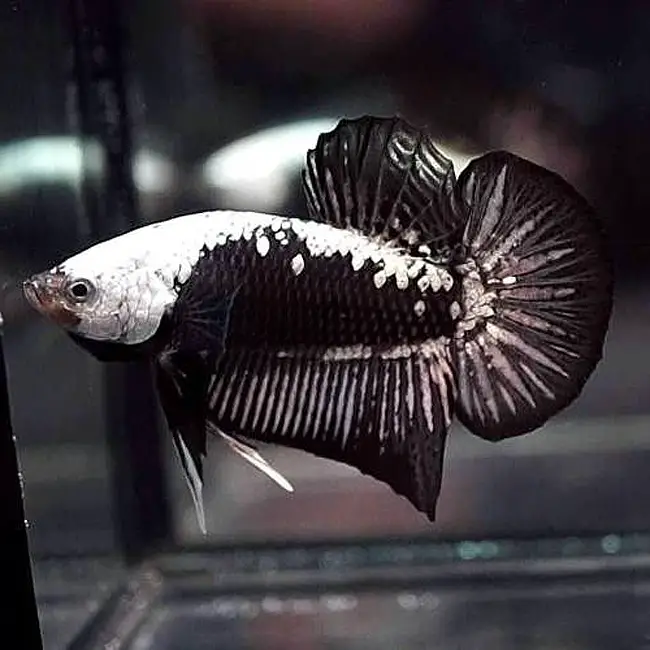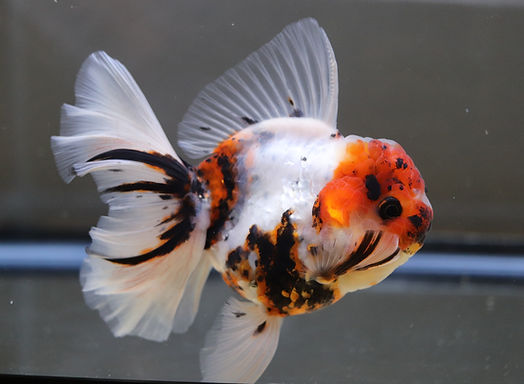Samurai Betta Fish: The Enigmatic Guardians of the Aquarium Realm
Samurai Betta Fish, with their enchanting beauty and captivating presence, are a beloved addition to many aquariums.
However, ensuring the health and well-being of these remarkable fish requires a deep understanding of their specific needs.
I will delve into recent studies and insights from experts in the field to provide you with a comprehensive guide to maintaining the optimal health and well-being of your Samurai Betta Fish.
Understanding the Unique Needs of Samurai Betta Fish:
Temperature and Water Parameters:
Recent research suggests that Samurai Betta Fish thrive in warm water with a stable temperature ranging from 78 to 80 degrees Fahrenheit (25-27°C). Maintaining these conditions is essential for their well-being.
Filtration and Water Quality:
Experts emphasize the importance of efficient filtration systems to maintain pristine water quality.
Regular water changes and monitoring of parameters such as pH and ammonia levels are vital for their health.
Diet and Nutrition:
Balanced Nutrition:
Recent studies conducted by leading experts in fish nutrition stress the significance of a balanced diet for Samurai Betta Fish.
High-quality pellet or flake food supplemented with occasional treats like frozen or live foods provides the necessary nutrients for their well-being.
Avoiding Overfeeding:
Experts caution against overfeeding, as it can lead to obesity and health issues. Following recommended feeding guidelines is crucial for maintaining their health.
Behavior and Enrichment:
Stress Reduction:
Experts in Betta fish behavior highlight the importance of reducing stress in captivity.
Providing ample hiding spots, live plants, and a peaceful environment can significantly improve their overall well-being.
Social Interaction:
While Samurai Betta Fish are known for their territorial nature, recent research suggests that limited social interaction with other compatible fish can provide mental stimulation and reduce stress, improving their quality of life.
Disease Prevention and Treatment:
Quarantine Protocols:
Experts recommend quarantine procedures for new fish additions to prevent the spread of diseases.
Isolating new arrivals for a few weeks allows you to monitor their health and prevent potential outbreaks.
Common Diseases and Treatments:
Citing research and expert advice, we’ll explore common health issues such as fin rot, ich, and velvet, providing insights into prevention and treatment options.
Breeding and Reproductive Health:
Optimal Breeding Conditions:
Experts in Betta fish breeding highlight the need for specific conditions, such as suitable tank setups, compatible breeding pairs.
And controlled water parameters, to ensure successful reproduction and the well-being of parent fish and fry.
Samurai Betta Fish Price
The Samurai Betta Fish is indeed a captivating and sought-after species in the aquarium world due to its striking appearance and distinctive behavior.
As mentioned, the price of Samurai Betta Fish can vary depending on several factors:
Size: The size of the fish can influence its price. Larger individuals might cost more than juveniles.
Coloration: Betta Fish come in a wide range of colors and patterns. Rare or unique colorations can command higher prices.
Health: The overall health and condition of the fish are critical. Healthy fish are typically priced higher, as they are more likely to thrive in their new environment.
Source: The price may also vary depending on where you purchase the fish. Pet stores, local breeders, and online sellers may have different pricing structures.
As mentioned, prices for Samurai Betta Fish often fall within the range of $15 to $30, but exceptional specimens or those with specific traits can be priced higher.
It’s important to research and choose a reputable source when purchasing a Betta Fish to ensure you are getting a healthy and well-cared-for fish.
Make sure to provide the appropriate tank setup and care to keep your Samurai Betta Fish happy and thriving in its new home.

Credit: www.nicebettathailand.com
What Makes a Samurai Betta?
You’ve highlighted some key characteristics that make Samurai Betta Fish stand out among their Betta counterparts, and your description provides a great overview of what makes them unique:
Distinctive Fins: Samurai Betta Fish are indeed known for their long and flowing fins, which give them an elegant and regal appearance. These graceful fin extensions set them apart from other Betta varieties.
Vibrant Colors and Patterns: Their bright and eye-catching colors, coupled with intricate patterns, make Samurai Bettas visually striking and unique.
These unique colorations and patterns are often the result of selective breeding.
Hardiness and Resilience: Samurai Betta Fish have a reputation for being hardy and resilient.
This resilience likely stems from their wild origins, where they had to endure challenging conditions and competition for resources.
This toughness makes them a popular choice for aquarists.
Fighter Origins: The reference to their origins in the wild, where they had to fight for food and shelter, is an interesting insight into their robust nature.
It’s a reminder of the evolutionary adaptations that have shaped these fish over time.
Samurai Betta Fish are not only visually stunning but also hardy and resilient, making them an excellent choice for aquarists seeking both beauty and strength in their aquariums.
Their unique characteristics and elegant appearance continue to captivate enthusiasts in the world of Betta keeping.
What is the Rarest Type of Betta Fish?
There are many different types of betta fish, but the rarest is the blue betta. This type of betta is very hard to find and usually costs more than other types.
The blue betta is a beautiful fish with a bright blue color. It is a peaceful fish that does well in a community tank.
What is a Black Samurai Betta?
A black samurai betta is a fish that is native to Thailand. It is a member of the betta family, which includes over 70 different species of fish.
The black samurai betta is one of the most popular types of bettas, and is known for its beautiful black coloration.
This fish is also known as the Siamese fighting fish, and has been used in traditional Thai boxing matches for centuries.
The black samurai betta typically grows to be about 4 inches long, and can live for up to 5 years in captivity.
What is the Rarest Betta Fish Colour?
There are many different types of betta fish, and each one has a unique set of colors. The rarest betta fish color is black.
This color is so rare because it is the result of a genetic mutation that causes the fish to produce less pigment in their skin.
As a result, black bettas are often rejected by breeders and are not commonly found in pet stores.
If you are lucky enough to find one, they make a beautiful addition to any aquarium!
Difference Between Black Mamba and Black Samurai Betta
Black mamba and black samurai are two different types of betta fish with distinct physical characteristics and origins.
The Black Mamba Betta is a variety of Siamese Fighting Fish that is predominantly black in color with iridescent green or blue scales.
This type of Betta is also known for its long, flowing fins and its aggressive behavior, which makes it popular among aquarium enthusiasts.
The Black Mamba Betta is named after the venomous African snake because of its sleek black appearance.
On the other hand, Black Samurai Betta is a type of Halfmoon Betta, which is also predominantly black in color but has a red or maroon hue.
They are known for their large, flowing fins that resemble a samurai warrior’s sword. Black Samurai Bettas are often sought after by breeders because of their striking appearance and unique coloration.
The main differences between Black Mamba and Black Samurai Bettas are their physical characteristics and origins.
While both have a predominantly black color, Black Mamba Bettas have iridescent green or blue scales and long flowing fins.
While Black Samurai Bettas have a red or maroon hue and large, flowing fins that resemble a samurai sword.
Conclusion
Ensuring the health and well-being of Samurai Betta Fish is a rewarding responsibility for aquarium enthusiasts.
By staying informed about recent research findings and heeding the advice of experts in the field.
You can create an environment that promotes their overall health, happiness, and longevity.
By following the guidelines provided, you’ll be well-equipped to provide the best possible care for your cherished Samurai Betta Fish, allowing them to thrive in your aquarium for years to come.




